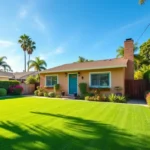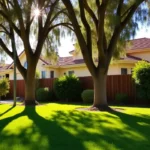Consider Your Outdoor Lifestyle
Before selecting hardscaping features, think about how you use (or want to use) your outdoor space. Do you love entertaining guests? A patio with an outdoor kitchen or fire pit might be a great addition. Do you need low-maintenance solutions? Opt for durable materials that require minimal upkeep, such as stamped concrete or pavers. If relaxation is your priority, a pergola or water feature can create a peaceful retreat.
Evaluate Your Space and Layout
The size and layout of your yard will determine what hardscaping features are feasible. A small backyard may benefit from multi-functional features like a combination seating wall and retaining wall, while a large property may have room for separate zones like a fire pit area, dining space, and garden pathways. Proper planning ensures that your hardscaping elements complement the natural flow of your landscape.
Choose Durable and Aesthetic Materials
Hardscaping materials should not only look great but also stand the test of time. Here are some popular choices:
Pavers: Available in a variety of colors, textures, and patterns, pavers offer both beauty and durability for patios, walkways, and driveways.
Concrete: Versatile and cost-effective, concrete can be stamped, stained, or textured to mimic more expensive materials.
Natural Stone: Adds a timeless and organic look but may require more maintenance.
Brick: Provides a classic and charming aesthetic, perfect for pathways and garden walls. Choosing the right materials will enhance the longevity and overall look of your landscape.
Think About Functionality and Drainage
Hardscaping should not only be visually appealing but also functional. For example, if you’re installing a retaining wall, ensure it is properly engineered to prevent erosion and provide necessary support. Driveways and patios should be graded correctly to allow for proper water drainage and avoid pooling. Consulting with a professional landscaper can help ensure these elements are designed for both beauty and efficiency.
Blend Hardscaping with Softscaping
Balance is key when integrating hardscape and softscape elements. Hardscape features should complement your plants, trees, and flowers rather than overpower them. Consider using greenery, vines, or garden beds to soften the look of stone and concrete surfaces. Adding planters, ground cover, and landscape lighting can also enhance the transition between the built environment and nature.
Stay Within Your Budget
Hardscaping is an investment, and costs can add up quickly depending on the materials and complexity of the project. Before you begin, set a clear budget and prioritize the most important features. A professional landscaper can help you explore cost-effective alternatives that achieve the look you want without exceeding your budget.
Work with Professionals
While some hardscaping projects can be DIY-friendly, larger installations like retaining walls, outdoor kitchens, and elaborate patios require professional expertise. A skilled landscaping team will ensure proper installation, adherence to local building codes, and long-lasting results.
Final Thoughts
The right hardscaping features can completely transform your outdoor space, making it more functional, beautiful, and valuable. By considering your lifestyle, space, materials, and budget, you can create a well-balanced landscape that enhances your home’s appeal. If you’re ready to bring your vision to life, LFR Landscape is here to help. Contact us today for expert guidance on your hardscaping project!




